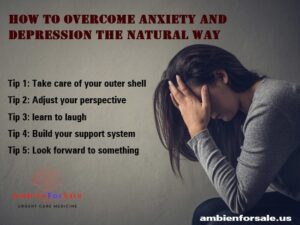How to Overcome Anxiety and Depression the Natural Way
Anxiety: Causes, Symptoms, Treatment, and More
The use of drugs to control and relieve mental symptoms has exploded in recent years. The use of psychopharmacology as the first line of defense against depression and Anxiety has resulted in more than 40 million prescriptions being completed in just one year in the United States.
While some patients report great success using these drugs, others are looking for ways to find calm and cope with trauma without resorting to medical intervention.
Tip 1: Take care of your outer shell
The effects of our eating, sleeping, and exercise habits on our mental health are often overlooked in traditional psychiatric circles. For example, experiencing a “hunch” is more important than we realize. Most of the chemical serotonin, which is pleasant to the touch, is made in our digestive tract.
These chemicals not only help improve mood but also help regulate a good sleep cycle. Combining a healthy diet with the endorphins released during exercise can be a great way to help prevent depression and anxiety.
Tip 2: Adjust your perspective
You may have heard the phrase: “You are what you eat”. While our physical health can determine some of our emotions and moods, we are also made up of what we think.
The whole premise behind the popular cognitive-behavioral therapy (CPT) approach is to identify the thoughts and beliefs that underlie our depression and anxiety responses to life. Once we recognize the patterns in our thinking that stimulate our negative emotions, we can catch those thoughts with control and refuse to let them be.
Tip 3: learn to laugh
It may sound silly to practice something that even a small baby can easily do, but many adults may have a hard time telling when they last laughed. This is unfortunate because it has been proven that endorphins are released into the bloodstream when you laugh. These endorphins provide temporary relief of mood and counteract the presence of stress hormones.
Tip 4: Build your support system
Anyone who has seen sitcoms from the ’90s knows the basic structure of diverse social groups. You have literary friends, smart friends, fun friends, and friends who always want to be serious. You have loving friends, reliable friends, and stupid friends (but you still like them). The protagonists of these shows always know which friends to turn to fulfill their needs and advance the plot.
While our circle of friends may not be as big as a TV show, we can also benefit from it recognize and nurture the types of friendships that make up our diverse personalities. Take some time to think about the nature of your relationship. Is there anyone in your life who can listen well without giving advice?
Do you have someone who can always help you see the better side? Is there someone in your life who will work with you to find a solution? If your friends and the family list doesn’t include any of these friendship features, you should consider expanding your social circle. We need people around us to help us grow, not those who push us to sink into our misery.
Tip 5: Look forward to something
If we don’t strive for anything, we’re more likely to hit it. If we don’t attract something positive on our way forward, life can look scary and devastating. The idea of having more days ahead of you to be like that behind can be misleading.
Whether you’re planning something big, like a career change, or something small, like a weekend getaway, being able to find your way around your calendar can motivate you to keep going.

